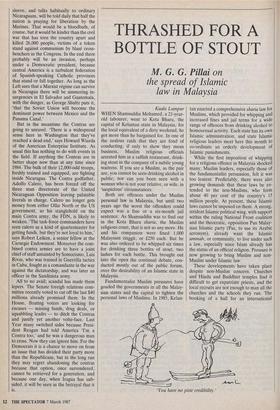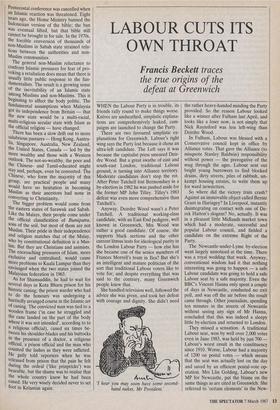THRASHED FOR A BOTTLE OF STOUT
M. G. G. Pillai on
the spread of Islamic law in Malaysia
Kuala Lumpur WHEN Shamsuddin Mohamed, a 21-year- old labourer, went to Kota Bharu, the capital of Kelantan state in Malaysia, for the local equivalent of a dirty weekend, he got more than he bargained for. In one of the zealous raids that they are fond of conducting, if only to show they mean business, Muslim religious officials arrested him in a raffish restaurant, drink- ing stout in the company of a nubile young waitress. If you are a Muslim, as the pair are, you cannot be seen drinking alcohol in public; nor can you been seen with a woman who is not your relative, or wife, in `suspicious' circumstances.
Both are offences under the Muslim personal law in Malaysia, but until two years ago the worst the offenders could expect was a fine or a six-month jail sentence. As Shamsuddin was to find out in the Kota Bharu sharia, the Muslim religious court, that is not so any more. He and his companion were fined 1,000 Malaysian ringgit, or £250 each. But he was also ordered to be whipped six times for drinking three bottles of stout, two lashes for each bottle. This brought out into the open the continual debate, con- ducted mostly out of the public forum, over the desirability of an Islamic state in Malaysia.
Fundamentalist Muslim pressures have goaded the governments in all the Malay- sian states and the capital to tighten the personal laws of Muslims. In 1985, Kelan- tan enacted a comprehensive sharia law for Muslims, which provided for whipping and increased fines and jail terms for a wide range of offences from drinking alcohol to homosexual activity. Each state has its own Islamic administration, and state Islamic religious leaders meet here this month to co-ordinate an orderly development of Islamic punishments.
While the first imposition of whipping for a religious offence in Malaysia shocked many, Muslim leaders, especially those of the fundamentalist persuasion, felt it was too lenient. Predictably, there were also growing demands that these laws be ex- tended to the non-Muslims, who form about 40 per cent of the country's 15 million people. At present, these Islamic laws cannot be imposed on them. A strong, strident Islamic political wing, with support within the ruling National Front coalition and the theocratic, opposition Pan Malay- sian Islamic party (Pas, to use its Arabic acronym), already want the Islamic ummah, or community, to live under such a law, especially since Islam already has the status of an official religion. Pressure is now growing to bring Muslim and non- Muslim under Islamic law.
These developments have taken place despite non-Muslim concern. Churches and Hindu and Buddhist temples find it difficult to get expatriate priests, and the local recruits are not enough to man all the churches and the schools they run. The booking of a hall for an international You have no piste credibility.' Pentecostal conference was cancelled when an Islamic reaction was threatened. Eight years ago, the Home Ministry banned the Indonesian version of the bible; the ban was eventual lifted, but that bible still cannot be brought in for sale. In the 1970s, the forcible conversion of thousands of non-Muslims in Sabah state strained rela- tions between the authorities and non- Muslim communities.
The general non-Muslim reluctance to confront Islamic pressures for fear of pro- voking a retaliation does mean that there is usually little public response to the fun- damentalists. The result is a growing sense of the inevitability of an Islamic state among Muslims and non-Muslims. This is beginning to affect the body politic. The fundamental assumptions when Malaysia got its independence from Britain — that the new state would be a multi-racial, multi-religious secular state with Islam as the official religion — have changed. There has been a slow drift out to more salubrious pastures — Hong Kong, Austra- lia, Singapore, Australia, New Zealand, the United States, Canada — led by the more wealthy and those with a Western outlook. The not-so-wealthy, the poor and the Chinese- and Tamil-educated might stay and, perhaps, even be converted. The Chinese, who form the majority of this group, are practical people and many would have no hesitation in becoming Muslim as their ancestors had none in converting to Christianity. The bigger problem would come from the eastern states of Sarawak and Sabah. Like the Malays, their people come under the official classification of Bumiputra, sons of the soil, but most of them are not Muslim. Their pride in their independence and religion matches that of the Malay, who by constitutional definition is a Mus- lim. But they are Christians and animists. The encroaching pressures of Islam, more exclusive and centralised, would cause more problems to Kuala Lumpur than they envisaged when the two states joined the Malaysian federation in 1963.
As for Shamsuddin, he had to wait for several days in Kota Bharu prison for his historic caning; the prison warder who had to do the honours was undergoing a hurriedly arranged course in the Islamic art of caning. The convicted man was tied to a wooden frame On case he struggled and the cane landed on the part of the body where it was not intended', according to to a religious official), caned six times be- tween his shoulder-blades and his buttocks in the presence of a doctor, a religious official, a prison official and the man who counted the lashes as they were inflicted. He gaily told reporters when he was released from prison that the pain he felt during the ordeal (`like prinpricks') was bearable, but the shame was to realise that the whole country knew he had been caned. He very wisely decided never to set foot in Kelantan again.



























































 Previous page
Previous page